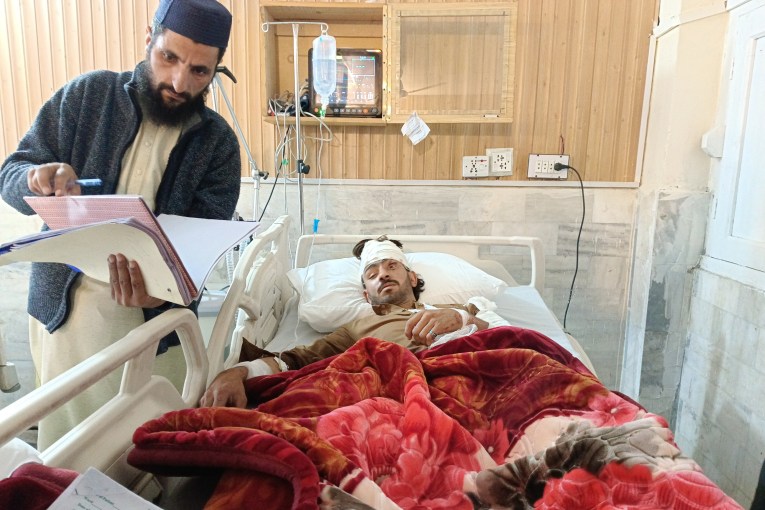Foreign Minister Marise Payne has flatly denied the federal government’s extraordinary measures to clamp down on travel from India are racist, but legal experts and human rights advocates are questioning the legality of the unprecedented jail threats.
“I think there is a serious question about its lawfulness under the Biosecurity Act,” citizenship expert Professor Kim Rubenstein said.
Under strict measures announced by the federal government in a post-midnight press release on Saturday, anyone found to have entered Australia after being in India within the previous 14 days faces up to five years in prison.
It’s in response to the country’s spiralling COVID disaster, with hundreds of thousands of new cases a day. But questions have been raised about why Australia took such extraordinary measures against Indian arrivals, but not when the US or Britain faced virus emergencies on a similar scale.
‘Not racist’: Payne
The potential jail time has been blasted as outrageous and dangerous, but Senator Payne said the response was required.
“It is entirely founded on the advice of the chief medical officer,” she said on Sunday.

India’s COVID surge has filled hospitals and crematoriums. Photo: AAP
Asked if the policy was racist, Senator Payne answered: “Absolutely not, in any way.”
Prime Minister Scott Morrison earlier denied the government was “forsaking” citizens stuck in India.
On Sunday, Senator Payne said the government “recognises the very difficult circumstances occurring in India”, but said the decision was based on a booming number of Indian arrivals testing positive for COVID in hotel quarantine on their return to Australia.
The Foreign Minister said about 10 per cent of positive cases in quarantine in March had arrived from India. In April, that rose to 57 per cent.
She said the explosion was “placing a significant burden” on hotel quarantine programs, which are already under heavy scrutiny as state leaders demand the federal government do more to help.
Mr Morrison has shrugged off repeated calls for Canberra to take over hotel quarantine, but his government’s India decision has been painted as a way to ease pressure on the states.
Western Australian Premier Mark McGowan called the India ban “very harsh” but said he backed it, even as he again whacked the federal government for not acting sooner.
“We want to make sure we prevent the importation and the spread of the virus within Australia,” Mr McGowan said.
Mr McGowan said the federal government allowing people to leave Australia to travel to India was “clearly a mistake”.
“We need to have foresight about what could occur. Leaving Australia, particularly going to COVID-19 ravaged countries at this point in time, should be an extreme exception,” he said.
India decision blasted
Labor leader Anthony Albanese called the India decision “extraordinary”.
“The government’s got to justify how it is that the figures from India are similar to what they’ve been in the past from the UK and the US, but we haven’t seen these sort of measures,” he said.
“Australia has obligations to our citizens, to people who are Australians, not just to abandon them overseas.”
Greens leader Adam Bandt pointed out “there weren’t these threats of jail time when dealing with predominantly white countries”, while independent MP Zali Steggall alleged it was “the first step to a totalitarian state”.
Human Rights Watch called the policy “outrageous”, while the Australian Human Rights Commission said the government needed to prove it was “not discriminatory”. Former race discrimination commissioner Tim Soutphommasane claimed it was “racial dog-whistling” and “an assault on the basic value of citizenship”.
Lawyer Greg Barns claimed it was “an abuse of criminal law”. Professor Rubenstein, an esteemed University of Canberra expert in citizenship law, asked if the ban was even legal.
My interview with @fauziah_ibrahim this morning on @BreakfastNews @abcnews 📺 (02/05/2021) – speaking about the travel ban and fines to be imposed upon Australians stranded in India seeking to return home. #auspol
See thread below to watch the full interview ⬇️.
(Part 1 of 4) pic.twitter.com/PFBIZCzAjO— Kim Rubenstein (@Rubenstein_Kim1) May 2, 2021
“The legislation itself says the minister is constrained by looking at whether it is appropriate… [and] no more restrictive than is necessary in the circumstances,” she told the ABC on Sunday morning.
“There are very serious questions here about whether this is no more restrictive in the circumstances, particularly when there is the presumption that citizens have a right of return.”
Professor Rubenstein said “we haven’t seen” evidence of what made India different to situations where Australia evacuated citizens or allowed them to come home from other virus hotspots at earlier stages of the pandemic.
“I think in those circumstances the government has to do more to justify how it is actually fitting within those legislative bounds, which on the face of it, it doesn’t appear to be doing,” she said.
Professor Rubenstein said that, because the Commonwealth could be doing more to bring people home – such as opening more quarantine facilities – the India decision might not be in keeping with the law.
“It isn’t a mutually exclusive scenario,” she said.









